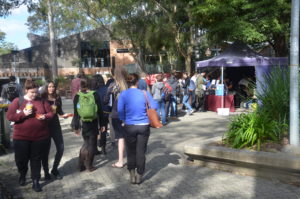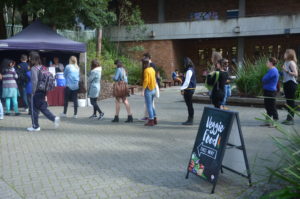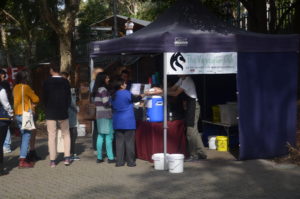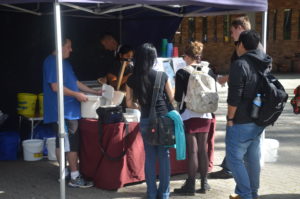Sometimes people think that the ancient Vedic literature no longer has any real usefulness in this day and age. That it is little better than an antique of foregone days. However, this article shows the universal and ever-relevant nature of the Ramayana, and how it explains the symptoms of society when there is no ruler, or when there is an unqualified leader. When there is no such ruler of a country, they describe an assortment of symptoms and problems in society that become prominent, and thus spoil life for the citizens. The descriptions are of a society that is falling apart, wherein the citizens are troubled by the lawlessness and corruption that abounds.
However, these symptoms are what we find so common in today’s world, which shows the timeless nature of the instructions given by these great sages.
Nonetheless, in other situations in the Ramayana, we find remedies for these problems. Such as when Vibhishana instructs Ravana on some of the duties of a king, which we briefly look at. However, Ravana did not like being instructed in this way because he was not interested in acting like a good king anyway, similar in ways to some of the rulers we see today.
Furthermore, the descriptions of Ayodhya when Lord Rama returns to lead the people shows the effects on society when there is a good and proper ruler, and how such a ruler should lead society for the ultimate good of everyone. It also shows the influence that such a king can have all over the land, which we obviously need more than ever in this world. So let us look at these descriptions.
THE RESULTS OF A LEADERLESS SOCIETY.
This especially points out how the Ramayana held views on the means for a harmonious society, and what helped provide or prevent it. This section outlines how a society without a leader, or without one that is qualified, will never be harmonious, and will actually exhibit symptoms that will prevent such a united society. Although these describe a time thousands of years ago when facilities were different, it can still be compared to what we would expect to see, or not see, in this day and age. Amazingly, many of the symptoms that are described are the same conditions as we see in society today.
The reason why I wanted to elaborate on these teachings is that as we look around this world, many parts of it seem to be falling apart with each passing day. How can we change things? It is time that people of the world understand what to look for in a leader if we are going to live harmoniously with ourselves or with nature. It is time that we know who to elect if we are going to have a leader who provides the right kind of protection and guidance, and who holds and practices the proper virtue if we are going to steer society in the right direction. And that is, unfortunately, not someone we often see today. It is not that the Ramayana is some kind of outdated book that no longer provides any wisdom, but we will see that it still holds practical advice that will help us correct our misguided aims of life by reconsidering the insight as given by the sages in the Ramayana. So let us take a look at some of these verses, and we will see many of the same indicators right now of a leaderless society that it describes.
This is from the Ayodhya Kanda, Canto 67, verses 9-38, as described by Markandeya and other great sages to urge Vasishtha to install a qualified prince onto the throne.
“In a land destitute of a ruler, the thundering cloud wreathed with lighting does not drench the earth with rain water.” 9
So here we see that drought is common when there is no proper ruler, or when society is misdirected. In such a situation, people no longer work in harmony with nature so that it reciprocates with the needs of the people. People often feel that nature is something to dominate and control, to take what they want from it. But actually we are a part of nature and should be in harmony with it. Otherwise, nature merely reflects the mass consciousness of the people who inhabit the planet, and thus drought is not uncommon.
“In a rulerless land, handfuls of seeds are no longer scattered (for fear of uncertainty of crops). (Nay) in a rulerless land, a son is not amenable to the control of his father, nor his wife amenable to the control of her husband (there being no executive authority to enforce correct conduct).” 10
Herein we see that a leaderless society becomes lawless, with no respect for authority on any level.
“In a rulerless land, people do not construct assembly halls (for public gatherings, there being no such gatherings), nor do joyous men plant lovely gardens (for fear of their being destroyed by enemies of peace and order) or build sacred houses (such as temples and buildings for the free accommodation of travelers and strangers, etc).” 12
In this way, no one builds elaborate structures since the lawless or the enemies will come and destroy them because of a lack of respect for the culture, or to drive out those who are not of the same disposition or religion.
“In a rulerless land, festivals (in honor of deities) in which actors and dancers exhibit their art in a highly ecstatic mood, and convivial gatherings promoting the welfare of the state do not gather strength.” 15
Again this shows how a sophisticated culture will be set to ruin by adharmic forces if there is not a ruler who can gather the means to defend the culture.
“In a rulerless land, parties to a law-suit are not able to have their dispute settled, nor are those given to hearing stories from the Puranas, etc., pleased with such stories told by those to whom the narration of such stories is agreeable.” 16
It may be somewhat amusing to see this description being a result of a rulerless land, especially in India where lawsuits are known to take many months or even years. Without a qualified leader who can execute an efficient system of law and order, the court system becomes increasingly backlogged with cases that are not resolved, not because they can’t be dealt with, but because of a lack of efficiency and honesty in the judicial system, and the interest of the courts to resolve such cases without accepting bribes or other complications before such cases are heard.
“In a rulerless land, virgins decked with gold ornaments do not for their part go united to gardens to sport at dusk (for fear of being abducted or violated by miscreants).” 17
These days no one can go out at night or even in daylight without the risk of being robbed or abducted. This is surely a sign of a lack of proper leadership wherein the citizens know that a crime will be punished, and people will be protected. Without good leaders, criminals know they can get away with many criminal acts.
“In a rulerless land, wealthy husband and cowherds, even though well protected (by their attendants) do not sleep with open doors (for fear of thieves and dacoits).” 18
Again, all doors to a house must be locked where there are criminals, or those who have no respect for authority, which means the authority is too weak to uphold the law and give appropriate punishment to criminals.
“In a rulerless land, the sound of plucking the bow-string with the palm produced by Kshatriyas uninterruptedly discharging arrows while practicing the use of bows is not heard.” 21
This merely indicates that those like the police or soldiers meant to protect the people are in limited numbers, and are not around to help keep law and order. This is usually because the leaders put their interests and priorities in other directions rather than in protecting law abiding citizens or in building a strong military or police force to defend the country and citizens.
“In a rulerless land, merchants travelling far and wide do not safely move about fully equipped with abundant salable goods.” 22
“In a rulerless land, nothing is one=s own in the eyes of anyone. Like fishes, men always devour one another. 31
Again, here we see that in a land without a qualified ruler, merchants cannot move about without the fear of being robbed or killed for their merchandise. In such a case, society is hardly civilized at all.
“In a rulerless land, there is no acquisition of property and no security of possessions. Nor is the army able in a rulerless land to vanquish the foes in a battle.” 24
Even the army becomes ineffective and without proper direction when there is no qualified leader, thus leaving the country vulnerable and unable to oppose its foes, or uphold law and order.
“In a rulerless land, self-controlled ascetics moving all by themselves and contemplating on the Self with their own mind and taking up their abode wherever the evening falls do not move about (freely for want of hospitable householders).” 23
Herein it is described how ascetics who hold the knowledge of the spiritual path are not very abundant, prominent, nor are they often respected. People in general lose interest in such topics when there is no ruler to show by example how to uphold, respect or protect the Dharmic path.
“In a rulerless land, men well-versed in sacred lore do not meet (freely) holding disputations in forests and groves.” 26
Again we see the lack of respect for those who hold within themselves spiritual knowledge, who no longer roam about ready to give such wisdom to the masses, knowing that they may simply meet with the contradictions and criticisms of materialistic people.
“In a rulerless land, flowers, sweetmeats and sacrificial fees are not brought together for the worship of deities by self-controlled men.” 27
In fact, even proper worship, pujas, and Dharmic traditions are soon lost without a leader who will uphold their protection. This means that such a leader must follow or at least respect the Dharmic traditions and the deep spiritual knowledge that is preserved therein.
“A state without a ruler is really no better than rivers without water, a woodland without grass, and cows without a keeper. 29
“If there is no king demarcating good and evil in the world, oh, this world will be reduced to (utter) darkness as it were and nothing can be clearly perceived.” 36
In other words, a land without a qualified ruler is a wasteland wherein the real goal of life is not understood, nor is it practiced, and mere existence with the attempt to avoid so many problems is all that is left to achieve, and that also only with great struggle. With this as the standard, such a society is reduced to utter ignorance of the true purpose of life.
WHAT THE KING IS MEANT TO BE
Now that we have seen some of what the Ramayana presents as dangers of a lack of real leadership, there are also a few verses that give insight to what a real ruler should be. This points out the power of such a king by these qualities, if he possesses them.
“(Just) as the eye ever strives for the good of the body (by serving as a guide to it and showing it the right path), so does the king, who is the fountain of truth and righteousness, ever strive for the good of the state. 33
“The king is truthfulness and virtue (incarnate); the king constitutes the nobility of birth in men of a high pedigree. The king is the mother as well as the father; the king is the benefactor of men. 34
“(Even) Yama (the god of retribution); Kubera (son of Vishrava, the god of riches), Indra (the ruler of gods), and the very mighty Varuna (the deity presiding over water) are outstripped by a king of excellent conduct by virtue of such conduct (inasmuch as he combines in himself the virtues of all the above-named deities).” 35
HOW A KING SHOULD GUIDE SOCIETY
A king is not only supposed to maintain law and order, but a real king, a Vedic king, should also provide the means that people can attain the real and spiritual goal of life. So now we look at the solutions to the above problems with how a king should give proper guidance to the people. This is described by Kumbhakarna while rebuking Ravana for all of his misdeeds. Naturally, Ravana, typical of many politicians today, did not like to hear such advice, simply because he had no intention of following it. But it is described in the Ramayana for our benefit.
From Yuddha Kanda, Canto 63, verses 7-21, it explains:
“Holding consultation with his ministers, he who takes into consideration the five aspects of the threefold duties (with reference to hostile kings) moves along the right path.” 7
In this case the five aspects means: 1. The method of initiating an action, 2. The person or material to be worked with, 3. The time and place of action, 4. Provisions necessary to make it successful, and 5. The calculated chances of success. And these aspects are used in three kinds of circumstances when dealing with enemies, which are: 1. The way to attain peace through reconciliation, 2. Acceptance of their allegiance through the acceptance of gifts, or 3. Invasion to force coercion toward peace. A ruler must be strong enough to make these considerations or he will be pushed aside or removed by the enemy who will take over his territory.
“A king who seeks to determine his duty in accordance with the science of polity and perceive his friends too, along with the ministers, understand aright.” 8
Herein, as explained, a king has to realize who he can trust among friends and ministers, and then he can move forward with confidence. This is essential if the king or ruler expects to stay in power or hold onto his position.
“The self-controlled king who, having deliberated with his ministers, bestows gifts, takes to (expedients of) conciliation and, sowing dissension among the hostile ranks, exhibits prowess, O prince of ogres, or resorts to them (all) together and takes recourse both to right action and the reverse of it at the right time and pursues virtue, worldly gain and sensuous pleasure at the proper time never meets with disaster in the world.” 11-12
A self-controlled king means a king with spiritual wisdom and virtue. Without understanding what real virtue is, no one can fulfill the proper role of a leader, or for that matter even a husband, teacher, father, or one who employs others. But more important than merely knowing what true virtue is, is the need to follow it and live according to those virtues, which is especially expected for any ruler. Only by applying this kind of wisdom and virtue will a king encounter success and avoid disaster, not only in his personal life but also for his country.
“A king should take action (only) after considering what is salutary in consequence to him in consultation with his ministers who make their living by their intelligence and know the reality of things.” 13
Herein the point is simple, that regardless of how intelligent a ruler may think he is, the saying is two heads are better than one, and a king must consult with his qualified ministers to make sure of the proper action to take. However, this verse also refers to ministers who know the reality of things, as opposed to those who are merely academically trained.
“People whose mental level is in no way higher than that of beasts, and (yet) who have been allowed to take their seat among counselors, desire to express their views through (sheer) impudence without fully knowing the import of the scriptures. The advice tendered by such people, who having no knowledge of the scriptures, are (equally) ignorant of the science of wealth, or who seek immense wealth, ought not to be followed. 14-15
“Men who tender unwholesome advice in a salutary garb through (sheer) impudence should be excluded from deliberation as they mar the (very) purpose (of the deliberation).” 16
Here is said the obvious, that those who are not qualified, though they may try to appear so by such things as academics, wealth, etc., and with pride may try to force their opinion on others, should not be given any consideration. No one should listen to them, not the citizens and least of all the king, because they will only take the country in the wrong direction, causing problems that will later take much time and money to correct. History shows many examples of this, from which we should learn. Furthermore, those who are not true friends of the king or of the citizens and have their own agenda, or who have been bought off by the enemy, will bring the ruler and the country to ruin, as explained in the next few verses:
“Getting united with shrewd enemies, (evil-minded) counselors in this world prevail upon their master to undertake wrong actions in order to bring him to ruin. 17
“A ruler should make out (the reality of) those ministers who have been won over by the enemy to their side (through bribe, etc.) and, thus, have become enemies though appearing as friends, (as discerned) through their (actual) behavior when a final decision is being taken after deliberation. 18
“Aliens find out the weakness of a ruler who is (easily) led away by false appearances and rushes headlong into actions … A king who, disregarding the enemy, does not actually protect himself, undoubtedly meets with reverses and is dragged down from his position.” 19-20
SOME OF THE SYMPTOMS OF RAMARAJA
What follows are descriptions of some of the symptoms of a proper and royal leadership, such as when Lord Rama ruled over the land. This shows the effects on society when there is a good and proper ruler, and how such a ruler should lead society for the ultimate good of everyone. It also shows the influence that such a king can have all over the land, and that any problems within the kingdom, at least in the olden days, was considered to be the fault of the king who then had to take responsibility and account for them through his own efforts, knowing it was his own lack of quality for the existence of such problems. Therefore, the people should make sure to avoid an unwanted and unqualified ruler and check that the leaders are properly qualified with knowledge and habits of virtue before being elected. Otherwise, the adversities and difficulties of life will be many.
This is from the Yuddha-Kanda, Canto 128, verses 98-106. This is when Bharata gives back the kingdom of Ayodhya to Lord Rama.
“While Sri Rama ruled over the kingdom (of Ayodhya), there were no widows to lament (over their loss) nor was there any danger from beasts of prey or snakes, nor again was there any fear of diseases. 98
“The world had no robbers or thieves, nor did anyone suffer harm. Nor again did old people (ever) perform obsequies relating to [the death of their] youngsters. 99
“Every creature felt pleased, (nay) everyone was devoted to righteousness. Turning their eyes towards Sri Rama alone, creatures did not kill one another.” 100
This is the effect of a qualified leader, that his influence can change the whole atmosphere in the cooperation among people, in reducing or eliminating the criminal mentality, in the endeavor to work in harmony with nature, and in everyone to have empathy for all creatures and fellow citizens. This may not be wholly possible in this day and age, but a qualified leader can certainly move humanity in this direction. But if a leader is merely posing as a great personality while harboring wicked or materialistic desires and misguided intentions, the whole country will be directed toward ruin.
“So long as Sri Rama ruled the kingdom (of Ayodhya), people lived to an age of thousands of years, were blessed with thousands of sons, and remained free from diseases and grief. 101
“So long as Sri Rama ruled the kingdom, the talks of the people centered around Sri Rama, Sri Rama, and Sri Rama alone. (Nay) the world itself appeared (to them) as transformed into Sri Rama. 102
“Trees in Ayodhya ever remained firmly rooted and bore fruit and flowers perpetually. Clouds sent down rain (only) when desired and the wind was (ever) delightful to the touch. 103
“Remaining entirely free from avarice and satisfied with their own avocations, the Brahmanas (priestly class), the Kshatriyas (the warrior class), the Vaishyas (members of the mercantile class), and the Shudras (the laboring class), remained content in their own duties. 104
“So long as Sri Rama ruled, the people remained devoted to pious observances and never told lies. (Nay) all were endowed with auspicious bodily marks and all were given to righteousness. 105
“With his (three younger half-) brothers, the glorious Sri Rama ruled for ten and one thousand years.” 106
THE KING IS FORCED TO ACCEPT 1/6TH OF KARMA OF HIS SUBJECTS
From the Ramayana we also understand how important it is for the ruler of people to watch or patrol over their territory to make sure that all unfairness, criminal activities, or unrighteous acts are immediately put to a stop. This is because all such actions produce contrary reactions, not only for the people and the country, but also for the ruler, which is reflected back on them through the acts of nature, disrespect from the citizens, and the dark future created for their next life. Therefore, this shows the importance of electing a ruler who will not neglect his responsibilities of leading the people properly, uphold virtue and spiritual wisdom, and protect and defend the citizens and country without hesitation.
In this regard, the Uttara-Kanda, Canto 74, verses 30-33, explains: “Whenever one performs unrighteous deeds not to be performed, and rooted in lack of prosperity, [such a person] indeed goes to hell, however the king also undoubtedly (goes to hell). Righteously ruling over the subjects, the king shares one sixth portion of the (merit) that accrues from pious deeds performed by study and penance. (However) the king also partakes of one sixth (of his subject=s bad karma) if he does not protect the subjects (by leading them properly). So you, O lion among kings, investigate your territory. Whenever you see unrighteous actions done, then make efforts (to put them right); thus righteousness and longevity will prevail among men [as well as for the king].”
REFERENCES
Srimad Valmiki-Ramayana, Sanskrit Text and English Translation, Gita Press, Gorakhpur, India, 1995.














 By Gunagrahi das Goswami
By Gunagrahi das Goswami By Hari Narayana Das
By Hari Narayana Das By the BBT Communications Team
By the BBT Communications Team




